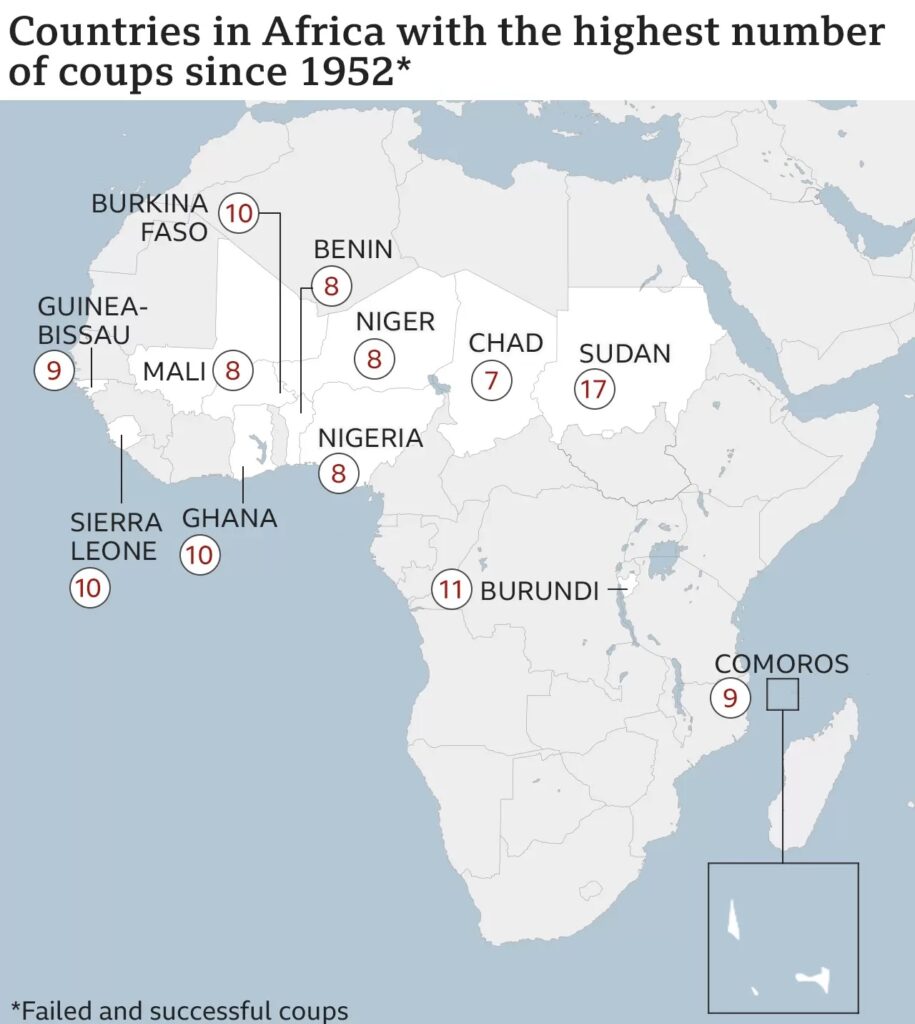Military coups in West Africa are on the rise as many countries experience deteriorating economic conditions and democratic backsliding prompting military intervention.
West Africa has experienced a tumultuous history of political instability characterised by military coups and political power struggles.
Although commendable progress has been made in recent decades to adopt a democracy as a form of governance, concerns still linger about the potential resurgence of coups in West Africa.
A coup is an illegal attempt, often by the military to seize power from leaders in power who have been elected by the electorate.
Historical military coups have often led to political instability, economic decline and the abuse of human rights. This is simultaneously unsurprising and ironic given the motive for military coups often stems from political instability and economic hardship within a country. Hence, whether military intervention is effective in addressing the initial problems the country may face.
A culture of military coups has been pre-existent within West Africa with 10 coup attempts in Burkina Faso, 17 attempts in Sudan and many other attempts see across countries such as Benin, Nigeria and Niger.

Some of the latest coups
On the 26th July 2023, the military placed President Mohamed Bazoum on house arrest and seized power.
The coup has legitimised their reasoning for seizing power stating President Mohamed Bazoum was a vessel representing French interests in Gabon. It’s fair to say the military was not explicitly defending the people but acted out of their interests as multiple military deals with France had previously been revoked.
General Abdourahmane Tchiani has declared himself the coup leader and is confident of the success of the coup.
The military takeover in Gabon is the latest coup to occur following the coup in Niger over a month ago. On the 30th August 2023, a military coup occurred in Gabon. President Ali Bongo was ousted and is currently on house arrest, which has ended over 50 years of the Bongo family reign in Gabon.
The coup was motivated by a recent election confirming President Ali Bongo’s third term as president. However, the opposition alongside the military believed voting was rigged leading to the military seizing power moments after the election results were announced.
Factors incentivising coups
Key challenges that constantly seem to incentivise coups stem from governance challenges, economic hardship and the erosion of democratic norms.
Firstly, many countries in West Africa are experiencing democratic backsliding as a result of corruption and poor governance resulting in weakening institutions. Hence the need for military intervention.
Similar to the point above, the erosion of democratic norms such as rigged voting and disrespect towards laws dismantle the foundation needed for democratic institutions to thrive. Simply, this foundation appears incredibly weak in some West African countries.
Finally, a country where poverty and high unemployment are prevalent is bound to experience a breakdown in the relationship between the government and the electorate. As the people may feel let down and unsupported by the government they may turn to the military as a source of help, which probes military intervention.
Could a resurgence of coups occur?
Whilst the frequency of West African coups is a cause for concern about the future, we must note there is an overall trend of West African countries trying to establish democratic institutions as they seek political stability.
Effective measures have also been put in place such as diplomatic pressure, economic incentivises and sanctions to deter coups and promote peaceful political practices.
As we acknowledge the possibility of coups resurging, vigilance is key to effectively spot emerging patterns.


